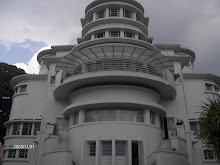Sintia Hamidah Ilyasa 0807340
Dik B 08
Periods of English literature
Old English period (450-1066)
The first works in English, written in Old English, appeared in the early Middle Ages (the oldest surviving text is Cædmon's Hymn). The oral tradition was very strong in the early English culture and most literary works were written to be performed. Epic poems were thus very popular and many, including Beowulf, have survived to the present day in the rich corpus of Anglo-Saxon literature that closely resemble today's Icelandic, Norwegian, North Frisian and the Northumbrian and Scots English dialects of modern English. refers to the literature produced from the invasion of Celtic England by Germanic tribes in the first half of the fifth century to the conquest of England in 1066 by William the Conqueror. During the Old English Period, written literature began to develop from oral tradition, and in the eighth century poetry written in the vernacular Anglo-Saxon (also known as Old English) appeared
Middle English period (1066-1500)
consists of the literature produced in the four and a half centuries between the Norman Conquest of 1066 and about 1500, when the standard literary language, derived from the dialect of the London area, became recognizable as "modern English."
Prior to the second half of the fourteenth century, vernacular literature consisted primarily of religious writings. The second half of the fourteenth century produced the first great age of secular literature. The most widely known of these writings are Geoffrey Chaucer's The Canterbury Tales, the anonymous Sir Gawain and the Green Knight, and Thomas Malory's Morte d'Arthur.
Renaissance (1500-1660)
While the English Renaissance began with the ascent of the House of Tudor to the English throne in 1485, the English Literary Renaissance began with English humanists such as Sir Thomas More and Sir Thomas Wyatt. In addition, the English Literary Renaissance consists of four subsets: The Elizabethan Age, the Jacobean Age, the Caroline Age, and the Commonwealth Period (which is also known as the Puritan Interregnum).
Augustan age (1700-1745)
The term Augustan literature derives from authors of the 1720s and 1730's themselves, who responded to a term that George I of England preferred for himself. While George I meant the title to reflect his might, they instead saw in it a reflection of Ancient Rome's transition from rough and ready literature to highly political and highly polished literature. Because of the aptness of the metaphor, the period from 1689 - 1750 was called "the Augustan Age" by critics throughout the 18th century (including Voltaire and Oliver Goldsmith).
Romantic period (1785-1830)
literature began in the late 18th century and lasted until approximately 1832. In general, Romantic literature can be characterized by its personal nature, its strong use of feeling, its abundant use of symbolism, and its exploration of nature and the supernatural.
Victorian age (1832-1901)
began with the accession of Queen Victoria to the throne in 1832, and lasted until her death in 1901. Because the Victorian Period of English literature spans over six decades, the year 1870 is often used to divide the era into "early Victorian" and "late Victorian." that the novel became the leading form of literature in English. Most writers were now more concerned to meet the tastes of a large middle class reading public than to please aristocratic patrons. The best known works of the era include the emotionally powerful works of the Brontë sisters; the satire Vanity Fair by William Makepeace Thackeray; the realist novels of George Eliot; and Anthony Trollope's insightful portrayals of the lives of the landowning and professional classes.
Modernism (1914-1945)
applies to British literature written since the beginning of World War I in 1914. The authors of the Modern Period have experimented with subject matter, form, and style and have produced achievements in all literary genres. Poets of the period include Yeats, T.S. Eliot, Dylan Thomas, and Seamus Heaney. Novelists include James Joyce, D.H. Lawrence, and Virginia Woolf. Dramatists include Noel Coward and Samuel Beckett.
Postmodernism (1945-present)
Following World War II (1939-1945), the Postmodern Period of British Literature developed. Postmodernism blends literary genres and styles and attempts to break free of modernist forms.
While the British literary scene at the turn of the new millennium is crowded and varied, the authors still fall into the categories of modernism and postmodernism. However, with the passage of time the Modern era may be reorganized and expanded.
References:
www.wikipedia.com
www.englisharticles.info
Klarer Mario (London: An Introduction to Literary Studies,1998)
Kamis, 01 Oktober 2009
Langganan:
Posting Komentar (Atom)


Tidak ada komentar:
Posting Komentar